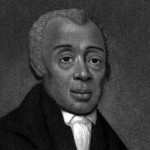Richard Allen was born a slave on February 14, 1760 in Philadelphia, PA. While laboring on his master’s farm, he showed an interest in Christianity and later joined a Methodist society. His master encouraged his religious interests, and was in turn converted and allowed Richard and his brother to earn their freedom.
Allen sought and achieved his education. As a free African American, he traveled through Delaware, Maryland, New Jersey, and Pennsylvania, preaching to all people regardless of race. Allen earned his living by cutting wood, laboring in a brickyard, and by driving a wagon during the Revolutionary War.
In 1791, Allen purchased an abandoned blacksmith shop. This building was dedicated as a church in 1794 becoming the home of the first African Methodist Episcopal (A.M.E.) congregation. An anvil was the first pulpit and lectern. Allen was ordained as bishop – the first African American bishop in America.
Allen was a strong supporter of the Anti-Slavery societies, president of the first Negro Convention, and a contributing correspondent to the first Black newspaper, Freedom’s Journal. He also established day and night schools.
Allen and his friend, Rev. Absalom Jones, organized the Free African Society, a non-denominational organization that fostered individual development and economic empowerment. The Free African Society sponsored a mutual aid society, a church, a political structure, and an insurance company.
From 1797 until his death on March 26, 1831, Allen operated a station on the Underground Railway for escaping slaves. This work was continued by Bethel A.M.E. Church in Philadelphia until slavery was abolished through adoption of the Thirteenth Amendment to the U.S. Constitution.

